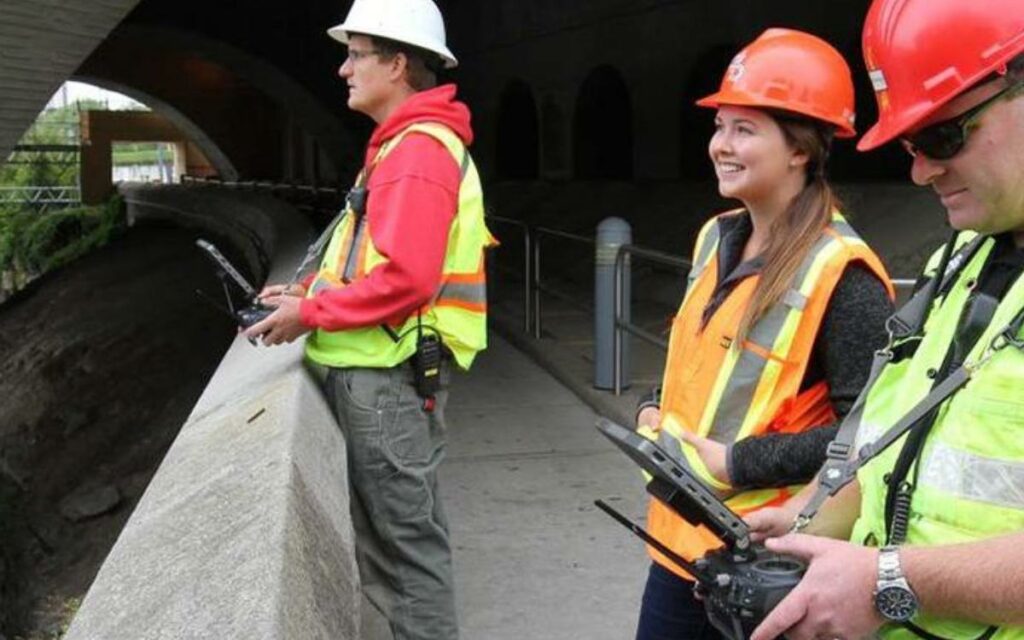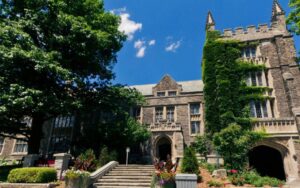
Hamilton college already recognized as national leader in the field. Photo credit: Mohawk College
Announced on May 8, Hamilton’s Mohawk College has signed a three-year memorandum of understanding with Transport Canada’s Innovation Centre to collaborate on research projects involving remotely piloted aircraft systems (RPAS, commonly known as drones).
Mohawk College already has a well-established Unmanned and Remote Sensing Innovation Centre (URSIC) that is a “national leader” in drone applied research with “dozens of industry research partnerships across Canada.”
That includes research and testing with Hamilton-Oshawa Port Authority, the City of Hamilton, and local railway companies.
It also includes an ongoing partnership with 407 International Inc., which manages the Highway 407 Electronic Toll Route (ETR). The 407’s partnership with Mohawk involves using drones to help conduct visual inspections of overhead structures.
Transport Canada’s Innovation Centre, “conducts advanced research across all modes of transportation, with an eye to informing regulatory approaches, improving departmental practices and contributing to the efficiency, safety and competitiveness of the sector.”
Federal Minister of Transport Omar Alghabra said that the partnership “is about supporting the development and testing of new ideas in the drone sector to make our transportation safer.”
In addition to the agreement with Transport Canada, Mohawk’s URSIC has also reached a three-year pilot agreement with the City of Hamilton to use Windermere Basin for drone research.
Windermere Basin is located in the area where Woodward Avenue becomes Eastport Drive at 105 Eastport.
The location will serve as a regional hub for research which Mohawk says will in turn attract technology companies and RPAS solution developers to the region.
Windermere Basin was selected as the research site due to its unique environment.
The area is a place where transportation networks, industrial lands, natural lands and the harbour converge. The area above is also designated as uncontrolled airspace, meaning drones will not interfere with any pre-existing flight paths.
Popular for birdwatching, Windermere Basin is also a somewhat environmentally significant area. As such, researchers will take care not to disrupt the natural environment.
Mohawk College’s Vice President (Academic) Dr. Cebert Adamson says that the college looks forward to “expanding our work in this fast-emerging industry.”
“Having a designated space that offers a variety of environments will allow URSIC researchers to assist industry partners across a number of important economic sectors. Hamilton is becoming a centre for RPAS innovation and this announcement will accelerate the research and development of RPAS technology in Canada,” Adamson continued.
Beyond URSIC, the college integrates drone training and research into several other areas of study including Building and Construction Sciences, Community Services, Chemical and Environmental Technology, Biotechnology and Communication Arts.
Mohawk College says that drone research at the site can also be useful to research partners in the areas of wastewater management, by-law enforcement, firefighting incident management response, search and rescue response, and pollution monitoring.
The Windermere Basin site will be used a couple times a month for uses such as drone flight training.
Research at the site is set to begin before the end of spring.

Based in Hamilton, he reaches hundreds of thousands of people monthly on Facebook, Instagram, TikTok, and Twitter. He has been published in The Hamilton Spectator, Stoney Creek News, and Bay Observer. He has also been a segment host with Cable 14 Hamilton. In 2017, he received the Chancellor Full Tuition Scholarship from the University of Ottawa (BA, 2022). He has also received the Governor General’s Academic Medal. He formerly worked in a non-partisan role on Parliament Hill in Ottawa.


















